
ChatGPT is a generative AI, owned by OpenAI and funded by Microsoft. It launched in 2022 and now has a user base count of over 200 million active users.
More than 45% of marketers already use ChatGPT for composing emails, preparing reports, and generating marketing content. Still, many of us are unaware of how to use ChatGPT for SEO.
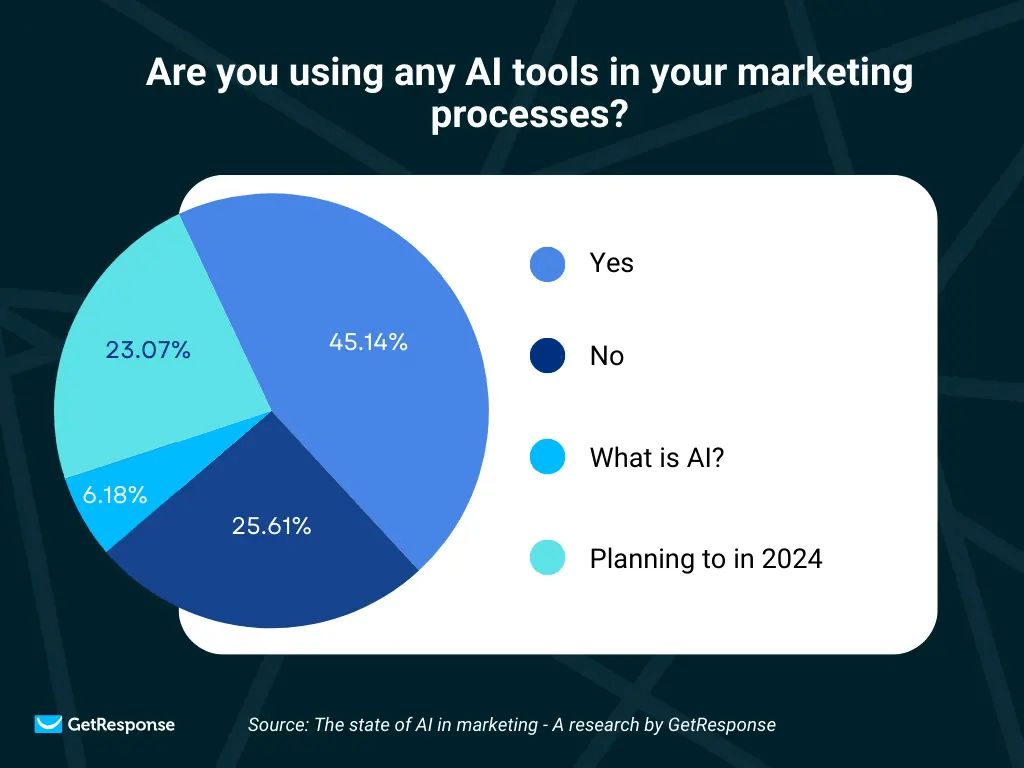
In this article, I will explore 30 SEO prompts for ChatGPT that are specifically crafted to enhance various aspects of SEO.
These prompts can help you generate ideas, optimize your content for SEO, analyze the keywords you are using, and improve your overall SEO strategy.
Can You Use ChatGPT for SEO?
Yes, ChatGPT can be extremely beneficial for search engine optimization by helping you brainstorm keyword ideas, create content outlines, and prepare meta tags.
ChatGPT is an incredible tool for content creators, marketers, and anyone who wants to produce high-quality, engaging content at scale.”
– Lillian Pierson, CEO of Data-Mania
Here is a list of SEO activities that ChatGPT can do for you:
- Generate SEO-friendly content ideas based on trending topics and keywords.
- Provide optimized meta descriptions and title tags for web pages.
- Assist in identifying long-tail keywords for content targeting.
- Create all-inclusive content briefs to improve your content strategy.
- Help optimize blog posts and articles for readability and SEO best practices.
- Generate FAQ sections or structured data markup ideas to enhance search engine visibility.
- Analyze competitor websites and SEO strategies for insights.
- Answer SEO-related questions and provide explanations on SEO concepts and best practices.
Does Google Penalize ChatGPT Content?
No, Google does not penalize ChatGPT content, provided human editors check it for accuracy and freshness before it's published.
Here is what Google says:
“Our focus is on the quality of content, rather than how content is produced.”
However, Google also warns black-hat SEO professionals and site admins by pointing out:
“Using automation—including AI—to generate content with the primary purpose of manipulating ranking in search results is a violation of our spam policies.”
Ultimately, Google concludes by saying that:
“Appropriate use of AI or automation is not against our guidelines.”
Therefore, Google emphasizes the importance of creating high-quality, original content that aligns with principles of E-E-A-T (Expertise, Authoritativeness, Trustworthiness), regardless of whether AI or humans generate it.
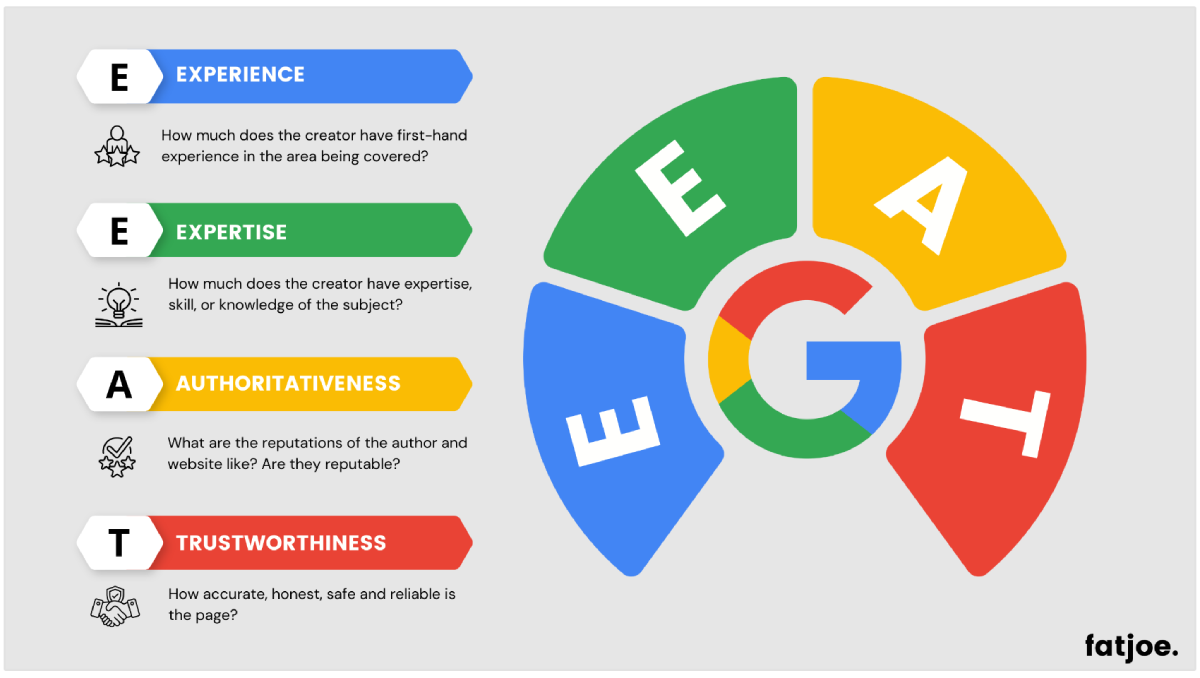
While AI-generated content can be beneficial when used responsibly to enhance creativity and utility, Google strictly prohibits its use for manipulating search rankings.
Google encourages web content creators and businesses to prioritize producing helpful, reliable content designed for users, reinforcing its commitment to delivering trustworthy information in search results.
Powerful ChatGPT Prompts Designed Specially to Improve Your SEO
Here are some of the SEO-related topics ChatGPT can help you with:
ChatGPT Prompts for SEO Keyword Research
ChatGPT can help you brainstorm keywords related to your brand or business.
It can even suggest long-tail keywords based on question-based queries that your target audience might use.
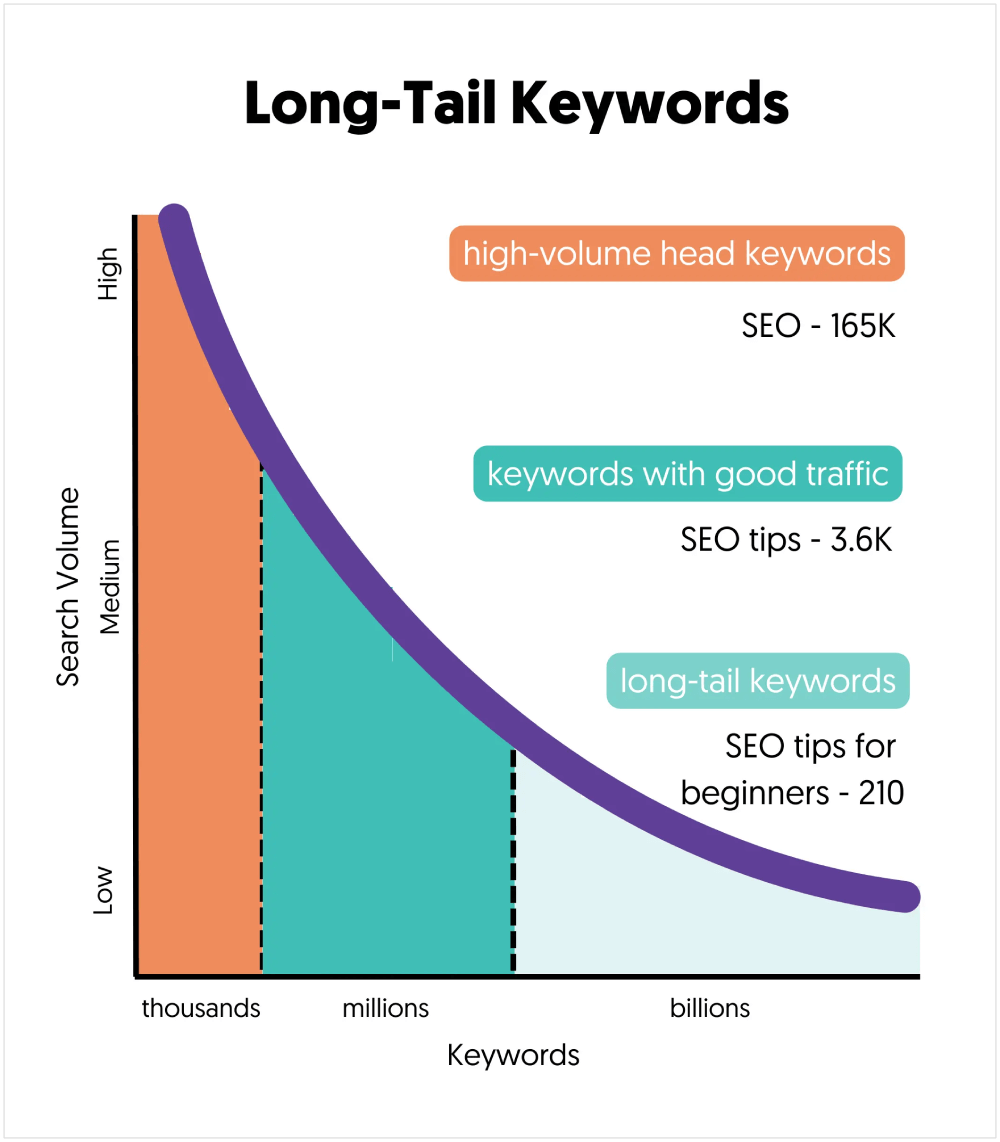
Here are the best ChatGPT prompts for SEO keyword research:
1. Find Keyword Ideas for Your Primary Topic
Using the prompt below, you can quickly identify a diverse range of short-tail, long-tail, LSI, and transactional keywords that reflect different user intents and search behaviors.
Prompt: Prepare a table of 100 keywords for the primary topic [your topic]. It should have short-tail, long-tail, LSI keywords, and transactional keywords.
Example: Prepare a table of 100 keywords for the primary topic, “ice cream recipes.” The list should include short-tail, long-tail, LSI, and transactional keywords.
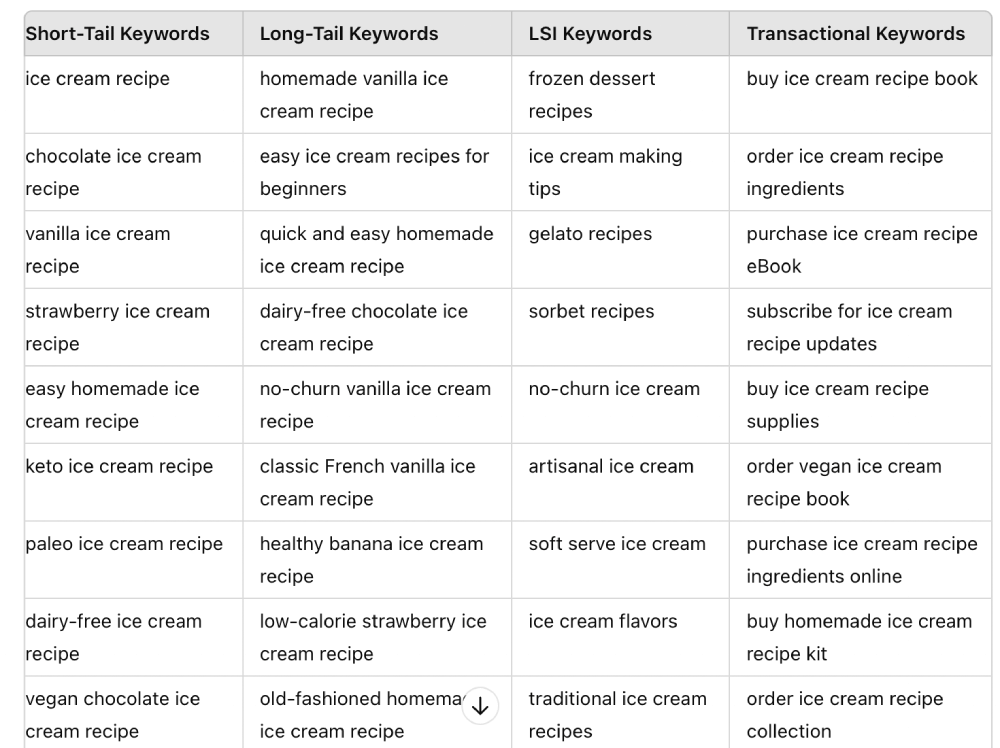
This prompt is useful for gathering a list of instant keyword ideas. You can give any number, like 50, 100 or 200, and ChatGPT will return that many keywords.
2. Prepare a List of Question-Based Keywords Related to Your Seed Keyword
Targeting question-based keywords is an excellent way to improve your SEO because they are long-tail and have less competition.
Here is the ChatGPT prompt to generate a quick list of question keywords:
Prompt: Find question-based keywords related to "[your seed keyword]"
Example: Find question-based keywords related to "CRM software."
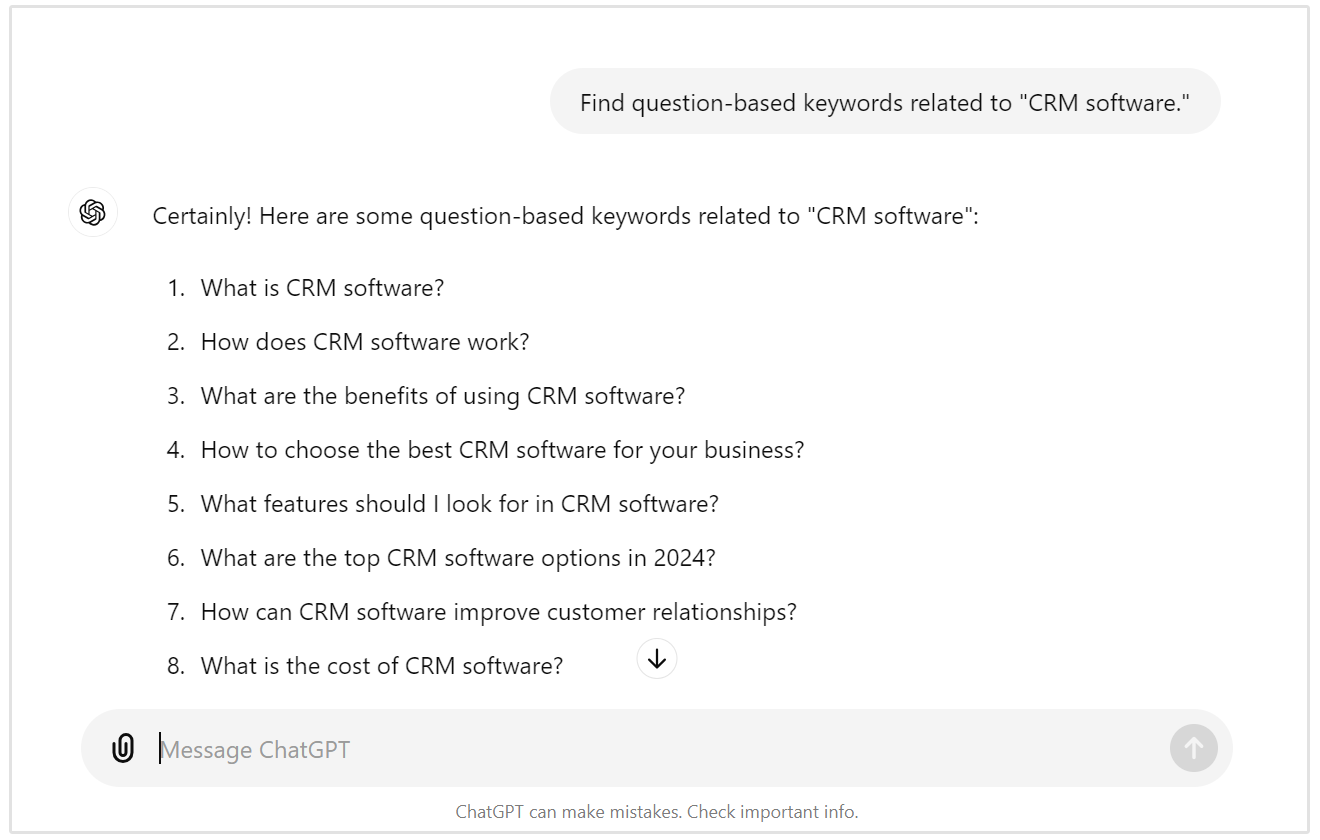
3. Extract Keywords from Specific Content
This prompt is useful for extracting keyword ideas from your competitor’s content. You can use this ChatGPT prompt to add more keywords to your list and refine them later for an improved SEO strategy.
Prompt: Find keyword ideas from the following text [add your competitor's content]
4. Generate a Long List of Keyword Ideas Using the Alphabet Soup Method
The "Alphabet Soup Method" is used in keyword research to generate additional ideas by leveraging Google's autocomplete feature.
It involves typing a root keyword or phrase into Google's search bar and then appending each letter of the alphabet (from A to Z) to the end of the keyword to see what autocomplete suggestions Google provides.
You can leverage ChatGPT's skills to generate an alphabetical list of keywords related to your niche. Here is the prompt:
Prompt: Suggest keyword ideas beginning from: “[seed keyword]” for a, then continue generating ideas for b, and so on till z.
Example: Suggest keyword ideas beginning from business ideas for a, then continue generating ideas for b, and so on till z.
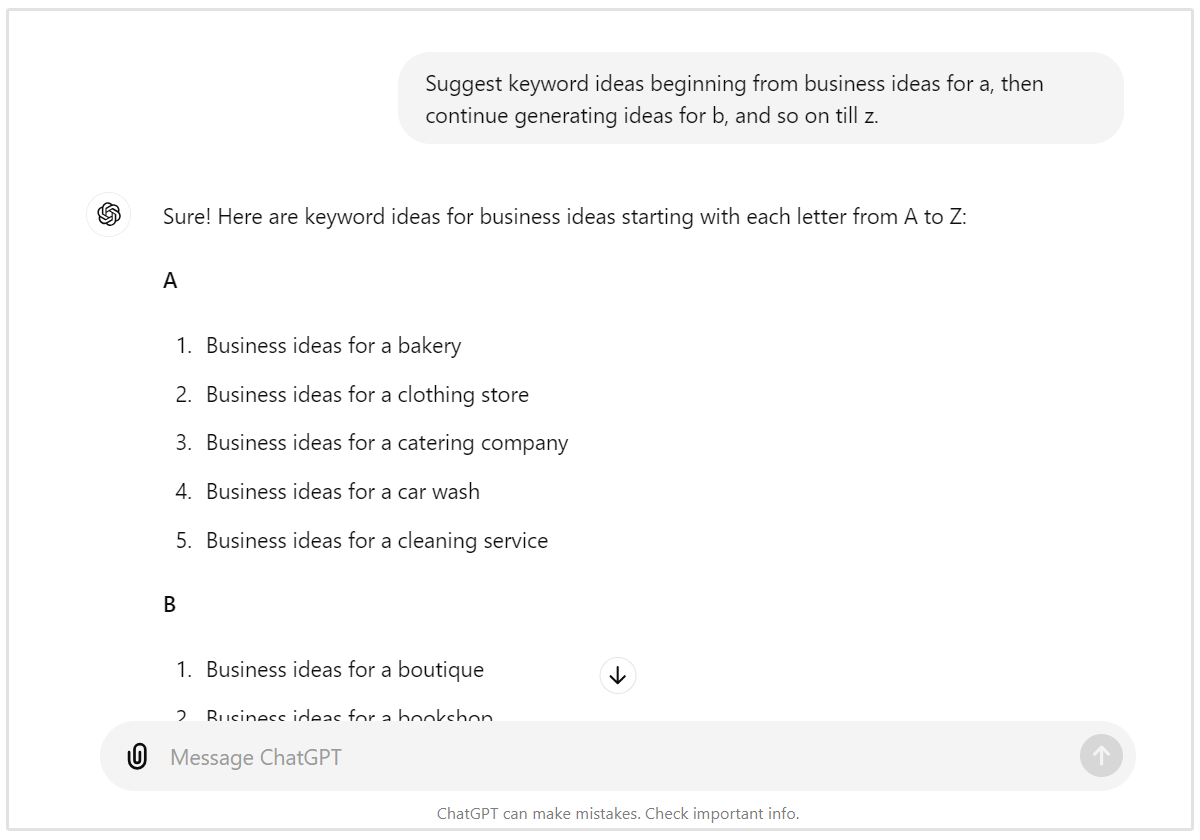
Bonus: You can save time by combining the data from ChatGPT with the SEOptimer Keyword Research Tool to get a complete keyword research report.
SEOptimer shows the search volume, identifies the lowest-competition keywords, checks CPC for each keyword, and examines the keywords your competitors are using.
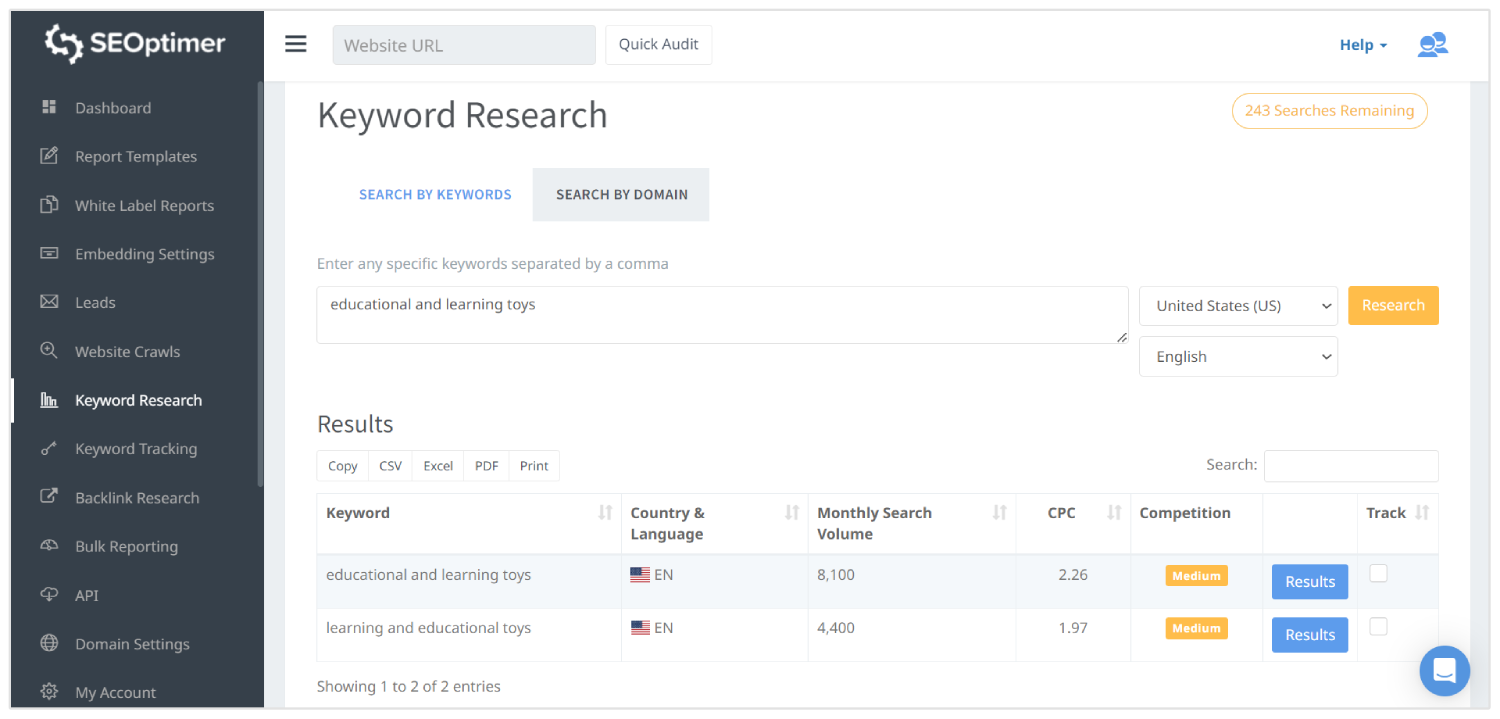
ChatGPT Prompts for Content Briefs
To prepare well-written and insightful content, you should provide your SEO content writing team with complete content briefs.
However, preparing detailed SEO content briefs takes a lot of time. These ChatGPT prompts can save time and help content writers and SEO copywriters prepare useful content to boost your SEO strategy.
5. Generate a Content Brief for Specific Topics
Use the below ChatGPT prompt to quickly generate article briefs based on your target keywords or topics.
Prompt: Create a content brief on the topic [Topic Here]. Include “word count,” “main keyword,” “meta description,” “SEO title suggestion,” “H1 suggestions”, and “instructions for writers.”
Example: Create a content brief on "Affiliate Marketing Trends for 2024". Include “word count,” “main keyword,” “meta description,” “SEO title suggestion,” “H1 suggestions”, and “instructions for writers.”
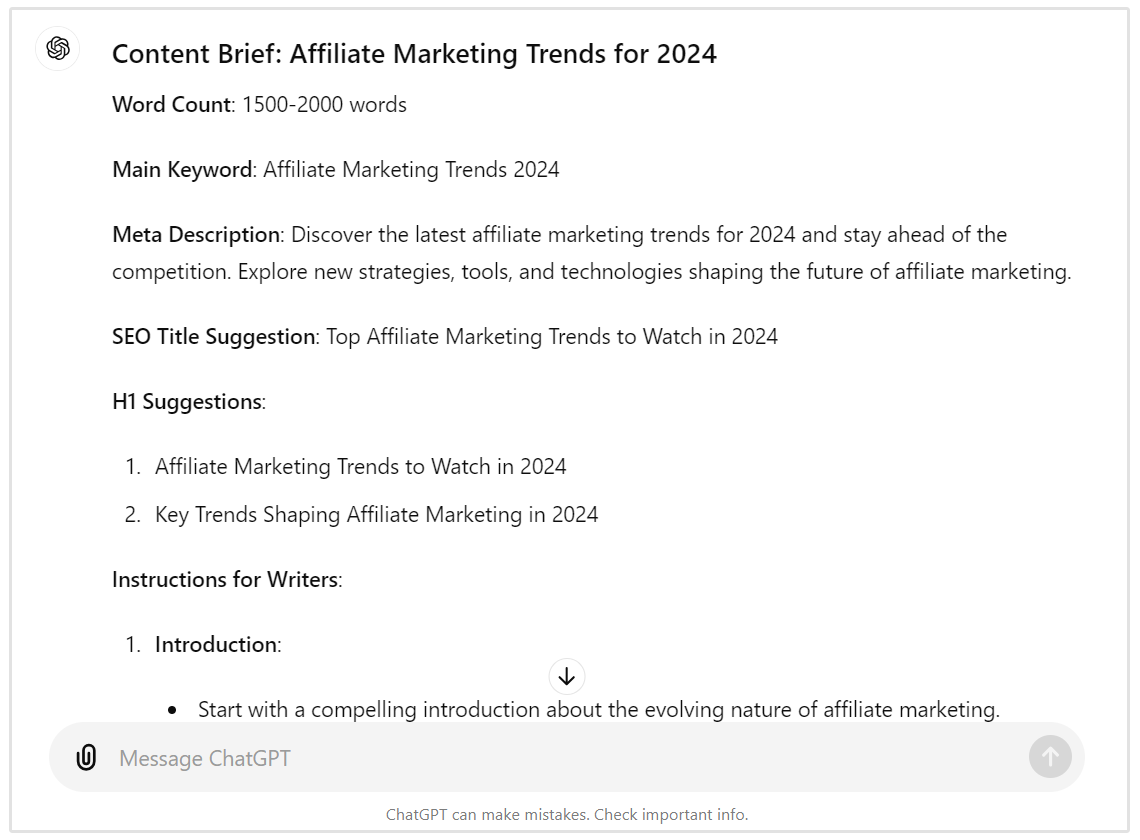
6. Prepare Content Briefs for a List of Products
Ecommerce SEO specialists and product teams know how to prepare user-friendly product descriptions. Complete, persuasive, and keyword-focused ecommerce product descriptions are required to optimize product pages for higher organic rankings.
With the ChatGPT command below, you can prepare quick content briefs for a complete list of products and save valuable time.
Prompt: Prepare content briefs for all the [product name] in the [product category]
Example: Prepare content briefs for all the pet products in the dog food category
7. Create Conversion-Focused Content Briefs
For conversion-focused landing pages, your content briefs should be spot on. If you want your writers to prepare high-converting landing pages, the below ChatGPT command works best:
Prompt: Prepare a conversion-focused content brief containing user intent, CTAs, LSI keywords to use, persuasive words to use, and word count. The topic is [Your Topic]
Example: Prepare a conversion-focused content brief containing user intent, CTAs, LSI keywords to use, persuasive words to use, and word count. The topic is "Best Dubai Travel Packages."
8. Prepare Content Briefs for Different Buyer Journey Stages
A well-rounded SEO strategy involves reaching users during different buyer journey stages.
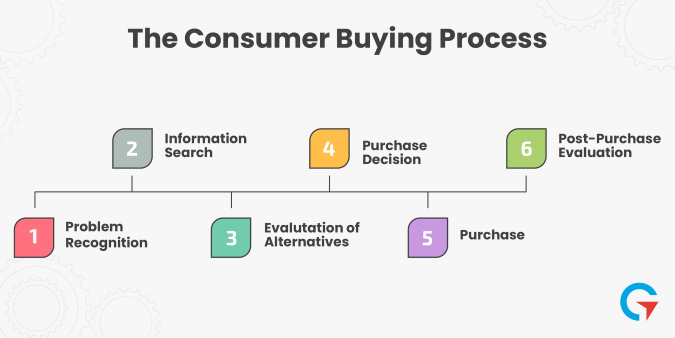
Hence, every article or blog post on your site should correspond to a specific phase of the customer journey.
The ChatGPT prompt below instructs the writers to prepare content based on the specific customer journey stage for improved relevancy and user intent.
Prompt: Prepare a content brief for the topic [Your Topic], including instructions on creating content according to the buyer journey stage. Similarly, create briefs for all these topics: [Include more topics here]
Example: Prepare a content brief for the topic "best video marketing platforms," including instructions to create content according to the buyer journey stage. Similarly, create briefs for all these topics: "What is video marketing? What are the top benefits of video marketing, and how do you choose the best platform?"
ChatGPT Prompts for Updating SEO Content
Regular content refresh is extremely important to prevent the loss of your existing organic traffic and to further improve your existing organic rankings.
These ChatGPT prompts are beneficial in revising the existing content on your site to improve your SEO plan.
9. Update Your Existing Content with New Keywords
It is an excellent idea to regularly edit your content to add new keywords based on competition analysis. This will help you rank your webpage for new keyphrases and increase your content's overall semantic relevance for your seed keyword.
Here is the ChatGPT prompt to update your existing content and include more relevant keywords for higher content relevance.
Prompt: Update this content to include the keywords “[add your keywords here]”: [add your content here]
10. Add Missing LSI Terms in Existing Content
One of the finest SEO tricks to increase your organic rankings for your target key terms is adding missing LSI terms to your existing content.
The below ChatGPT command lets you add the missing LSI keywords to boost the SEO score of your existing content.
Prompt: Insert these LSI terms in the content: [Include LSI Terms] [Content Here]
Example: Insert these LSI terms in the content: Shopify store ranking, Product page SEO, Shopify keywords: [Content Here]
11. Include Statistics in Your Content
People love content that includes stats because it adds credibility, authority, and reliability to the information presented.
You can quickly include relevant stats in your content by using the following ChatGPT command (just be sure to double check the accuracy of the stats before you publish the post):
Prompt: Include a list of the latest stats related to this topic: [your topic] [Mention the source of the stat in brackets. All stats should have numbers in them]
Example: Include a list of the latest stats related to this topic: Key SEO Trends For 2024 [Mention the source of the stat in brackets. All stats should have numbers in them]
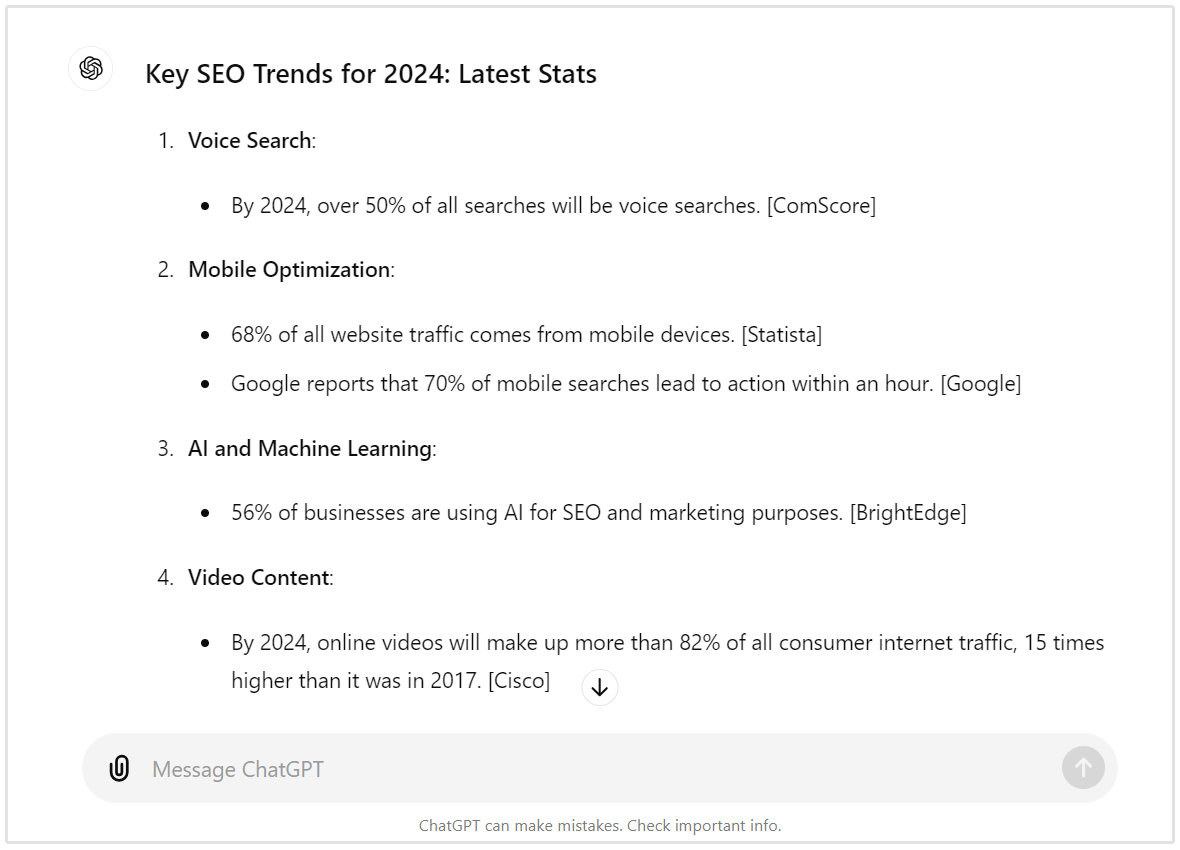
12. Revise Your Article Intro to Achieve a More Emotional Connection with Your Audience
People love brands that leverage storytelling to prepare authentic content pieces that connect with them on an emotional level.
For SEOs, it is one of the finest tactics for increasing time spent on page and conversions.
When people feel that the content is written just for them, they can better connect with the product you are promoting, and the chances of selling increases.
Here is the ChatGPT prompt to prepare an emotionally thought-provoking introduction for your existing content pieces:
Prompt: Prepare an intro for a “seed keyword” (list what to include) with the readers of this topic: [Your Topic]
Example: Prepare an intro for an emotional connect (explain what goes wrong in marriage, what are the reasons for divorce, how a lawyer is helpful) with the readers of this topic: Why Do You Need a Divorce Lawyer?
ChatGPT Prompts for Generating FAQs
FAQs are important because they directly cater to user intent by addressing common queries concisely and informatively.
Incorporating relevant long-tail keywords into these questions and answers can enhance their chances of ranking for specific search queries.
FAQs also contribute to a better user experience by providing easy access to essential information, potentially reducing bounce rates and increasing engagement.
Moreover, structured FAQs are more likely to appear in featured snippets, boosting their visibility and credibility in search engine results.
Here are some of the best ChatGPT prompts to easily include relevant FAQs into your existing pages:
13. Generate Long-Tail Keyword-Based Questions for Your Target Query
One of the commonest ways to use ChatGPT to prepare FAQs is to ask it straightaway to prepare a list of FAQs based on your target keyword.
Here is the prompt to do that:
Prompt: List the most popular long-tail keywords in question format for “your seed keyword.”
Example: List the most popular long-tail keywords in question format for the keyword “HR Management.”
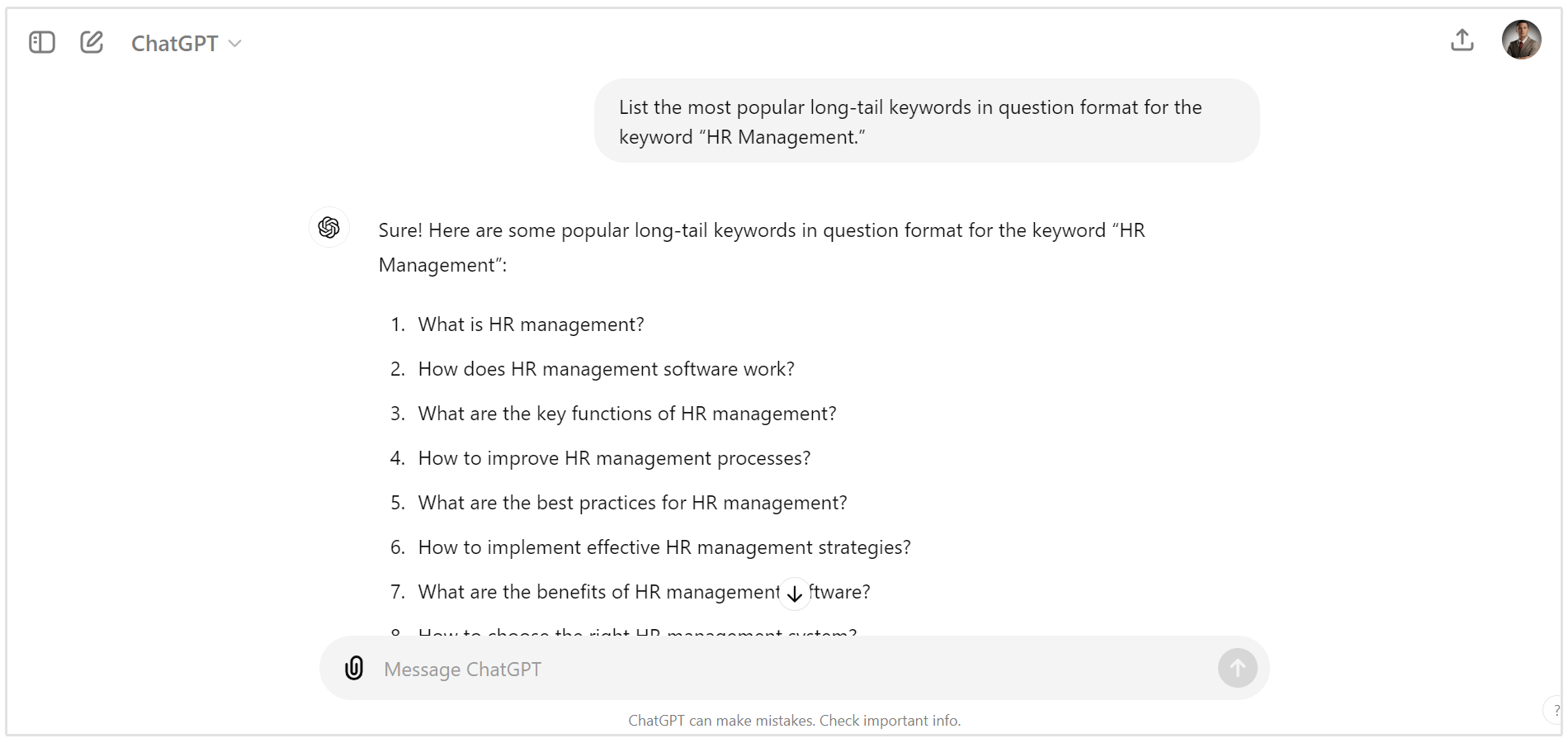
14. Get a List of People Also Ask (PAA) and Related Search Questions
People Also Ask are interactive search results on Google that expand upon related questions based on user queries. They appear as dropdowns that users can click to reveal more detailed answers.
Here is the prompt to generate a list of relevant PPAs and related search FAQs based on your keyword or topic.
Prompt: Give me a list of 10 related searches and people also ask questions for the topic [Enter your topic]
Example: Give me a list of 10 related searches, and people also ask questions for the topic "Pet Grooming."
15. Create Product FAQs for Ecommerce SEO
A list of FAQs is important for each ecommerce product because it helps users and search engines find critical questions related to the main product, thereby improving content relevance and user experience.

Prompt: Prepare a list of 3 FAQs based on this product description [add your product description]
16. Prepare a List of FAQs Related to Misconceptions in Your Target Industry
Addressing common misconceptions helps educate your audience and clarify inaccurate information that may impact their decisions or perceptions about your products or services.
By proactively answering questions and dispelling myths, you improve the overall user experience on your website.
Here is the prompt to generate a list of useful misconceptions-based FAQs.
Prompt: Create some FAQs that address misconceptions about [your target industry]
Example: Create some FAQs that address misconceptions about cosmetic surgery.
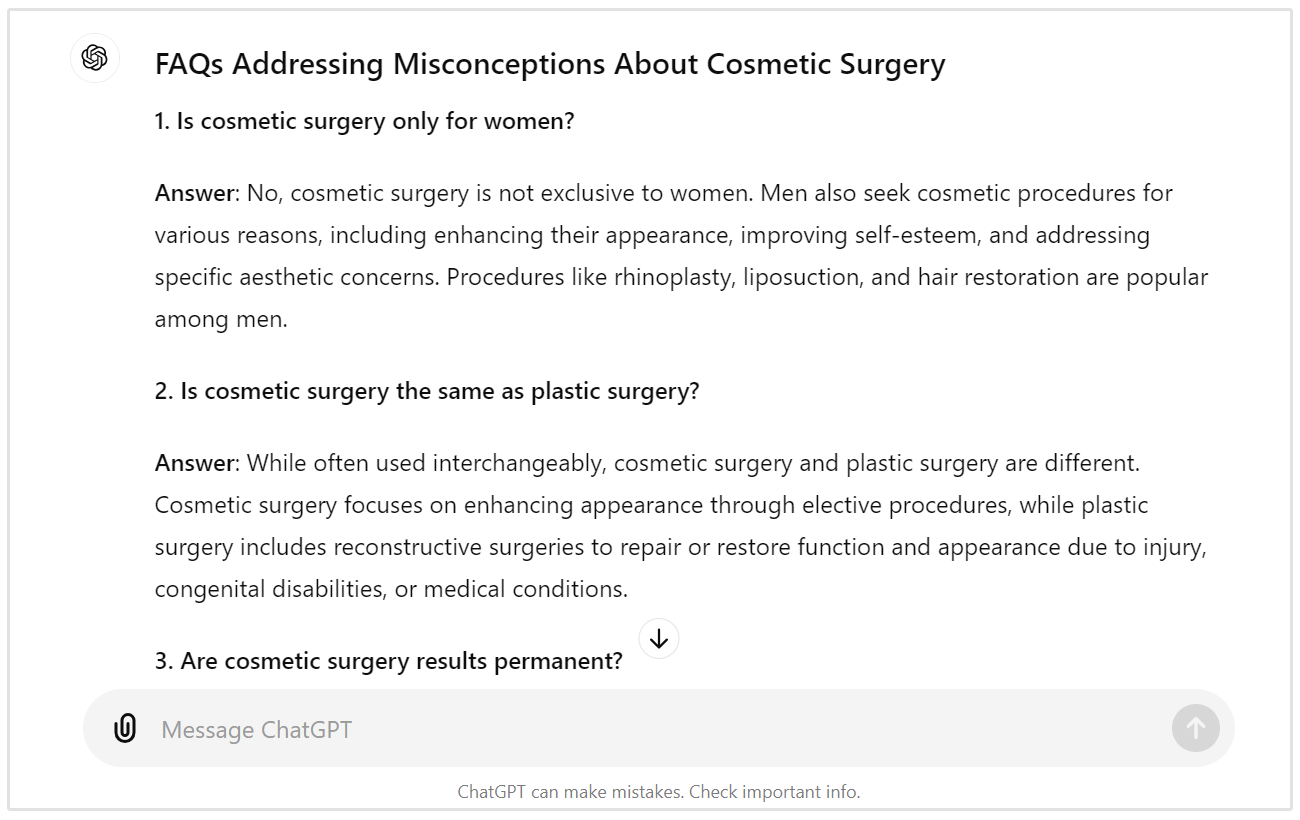
ChatGPT Prompts for Content Analysis
ChatGPT can provide quick and detailed insights into various aspects of content, including readability, EEAT optimization, semantic relevance, and sentiment analysis.
Here are the top ChatGPT prompts for content analysis and research:
17. Perform Google E-E-A-T Analysis of Competitor’s Content
E-E-A-T analysis focuses on content quality, accuracy, depth of information, and author’s experience. By assessing competitors' content, you can identify gaps or weaknesses in your content that need enhancement to meet user expectations and search engine criteria better.
Prompt: Analyze the below content for the Google E-E-A-T ranking system for Experience, Expertise, Authoritativeness, and Trustworthiness. [addyour content and also include the author bio]
18. Semantic Analysis of Competitor’s Content
Analyzing semantic patterns in competitors' content reveals gaps in your content strategy. It helps identify topics or aspects that competitors cover effectively, but you may have overlooked, allowing you to fill those gaps with targeted content.
Here is the prompt for careful semantic analysis of your competitor’s content:
Prompt: Analyze my competitors' content for the keyword "[add your keyword]" and perform a semantic analysis. Here is the content: [share your competitor’s content]
19. Readability Analysis of Your Site Content
Identifying readability issues allows you to revise and optimize content for better clarity and effectiveness. This includes restructuring sentences, using simpler language where appropriate, and improving overall readability scores.
Here is the ChatGPT prompt to prepare clear and well-written content:
Prompt: Analyze and improve the readability of this content. [paste your content]
20. Count the Number of Times Your Target Key Phrases Are Present in the Content
Monitoring keyword density (the ratio of target keywords to the total number of words) helps maintain a natural flow of language while ensuring sufficient optimization. Balancing keyword usage prevents over-optimization, which can negatively impact SEO.
You can use the below prompt to track key phrase frequency in your content:
Prompt: Count the number of times the following keywords [add keywords here] are present in the content: [Paste your content]
21. Perform Sentiment and Emotional Analysis of Content
Emotional analysis reveals how well content elicits desired emotional responses. Aligning emotional triggers with marketing goals (e.g., trust-building, excitement) can optimize content for greater impact and engagement.
You can use this prompt to better connect with your ideal customer persona:
Prompt: Perform sentiment and emotional analysis of this content: [paste your content]
ChatGPT Prompts for Competitive Analysis
ChatGPT is a real-time saver for performing SEO competition analysis. You can use different ChatGPT SEO prompts to reveal competitor’s target keywords, audience persona, product features, and several other aspects to minimize gaps in your SEO strategy.
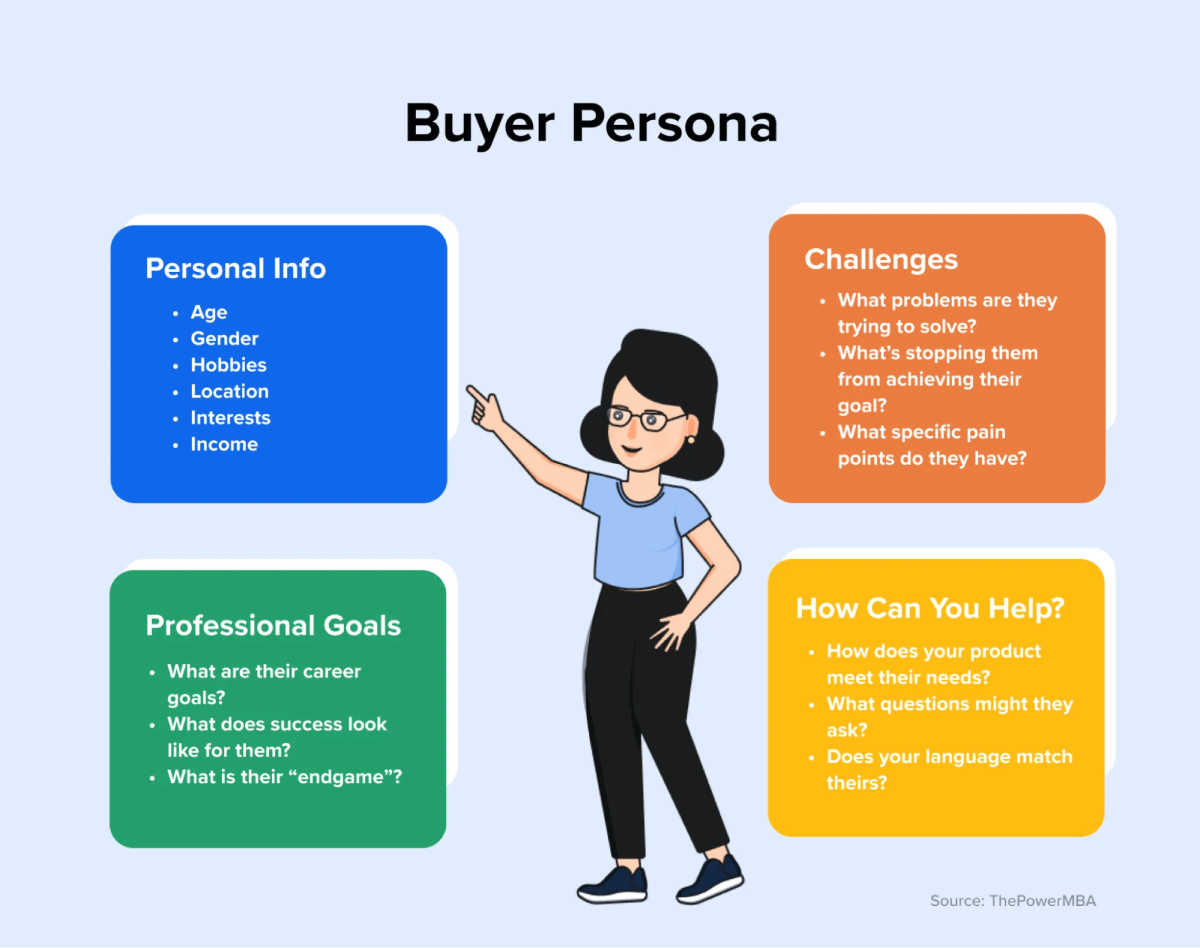
Here are the best ChatGPT prompts for SEO competitor research:
22. Prepare a List of Major Competitors
The simplest of ChatGPT commands is to ask it to send you a list of your main competitors by giving it your website URL. Here is the prompt:
Prompt: Prepare a list of the top 3 SEO competitors for [your website URL]
Example: Prepare a list of top 3 SEO competitors for Slack.com
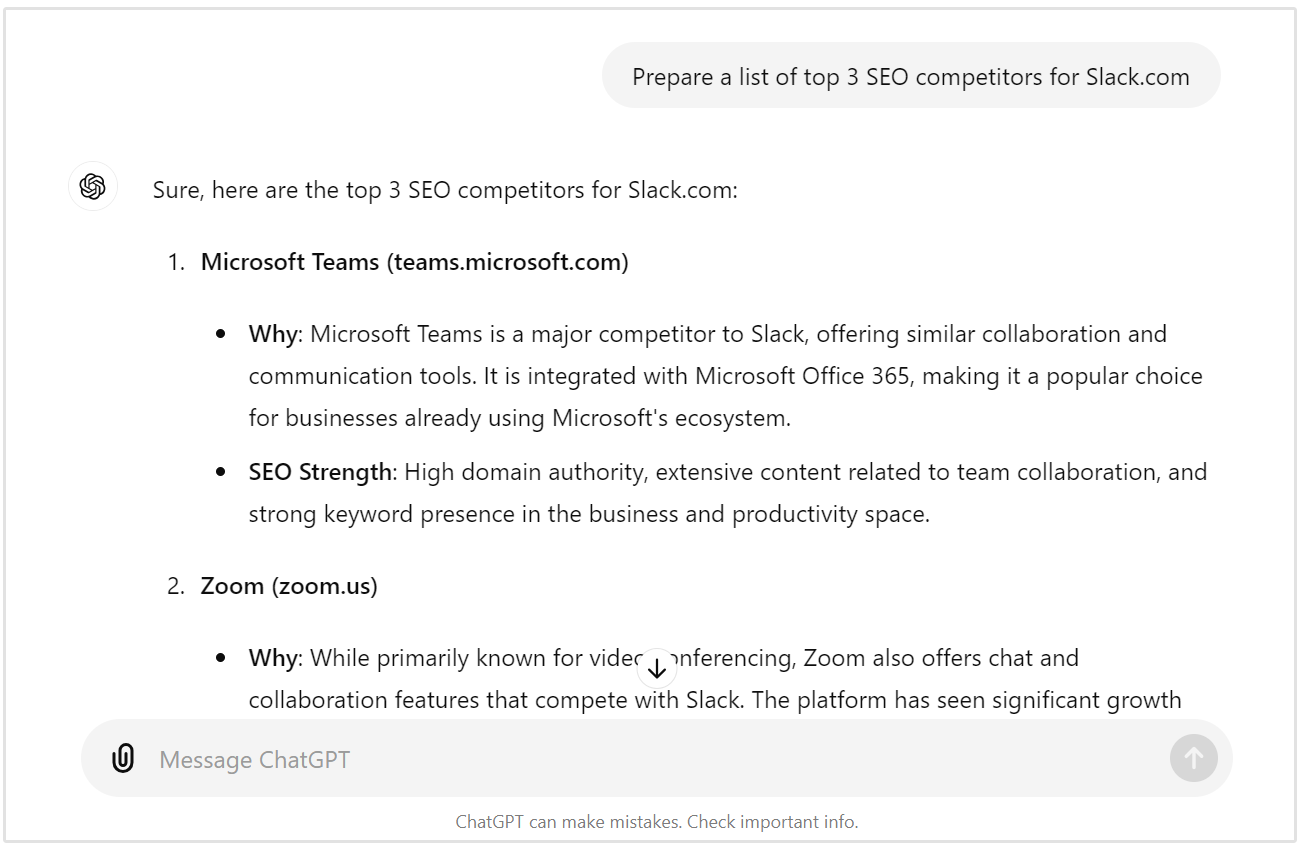
23. Reveal the Audience Persona and Primary Target Keywords of Your Competitors
You can use the prompt below to reveal your competitor’s buyer persona and target keywords accurately.
Prompt: Analyze the audience persona and major keywords targeted for [name your competitors]
Example: Analyze the audience persona and major keywords targeted for HubSpot, Salesforce, and Zoho for their CRM products.
24. Find Your Competitor’s Major Product Features, Keywords, and Pricing
For a more in-depth competitor product analysis, use the prompt below to identify product features and pricing gaps for a user-focused SEO content plan.
Prompt: Prepare a table listing all the [share your product category] in the market. Share their features, target keywords, and pricing [List your competitors].
25. Generate Blog Post Ideas Based on Your Competitor’s Organic Keywords
This is one of the finest ChatGPT tricks I use to quickly prepare a list of relevant blog post ideas based on my competitor’s target keywords. The prompt is provided below:
Prompt: Suggest blog post topics based on these competitor keywords and also suggest the target keyword for each suggestion: [List your competitor’s keywords]
ChatGPT Prompts for Technical SEO
You can use the below ChatGPT prompts to perform several technical SEO tasks:
26. Create XML Sitemaps
An XML sitemap is a file that lists a website's pages for search engines to crawl and index efficiently, enhancing SEO by improving page visibility and accessibility in search results.
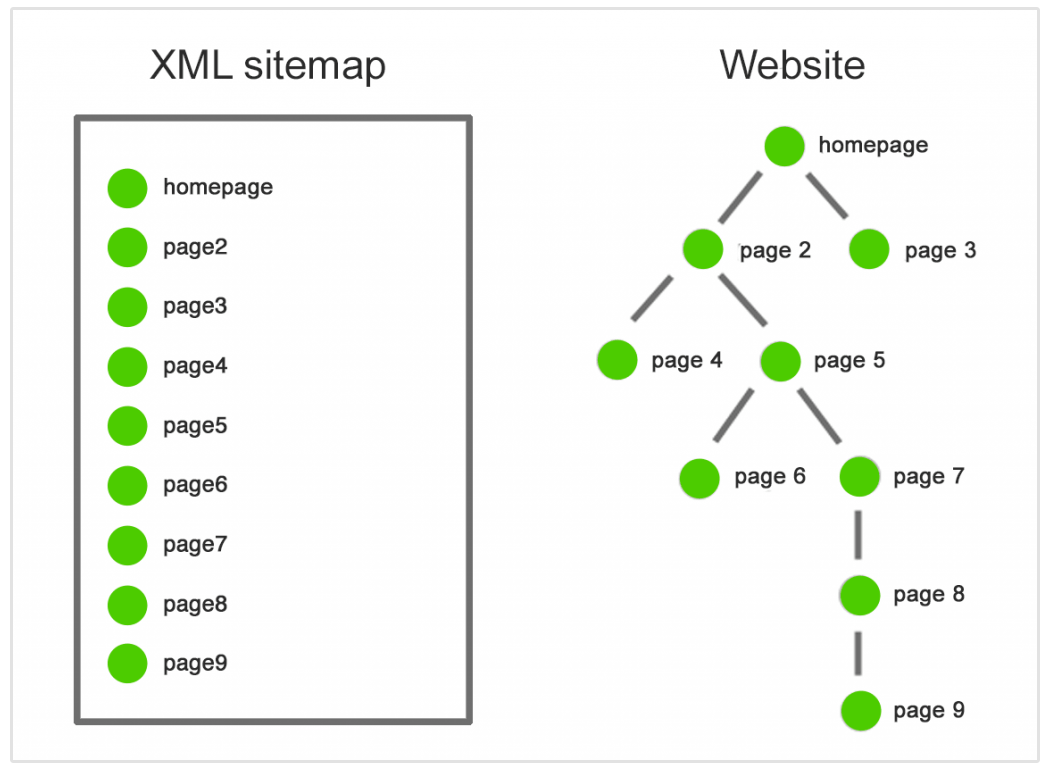
Here is the prompt to create a valid XML sitemap for smaller websites:
Prompt: Create an XML sitemap having the following URLs: [List your URLs]
27. Prepare Meta Tags for a List of URLs
You can use ChatGPT to quickly produce a list of relevant meta titles and description tags for a list of URLs. Here is the prompt to do that:
Prompt: Prepare meta titles and descriptions for the following URLs: [insert URL]
28. Create FAQ Schema Markups
FAQ Schema Markup is a structured data markup that can be added to HTML code to provide search engines with specific information about frequently asked questions (FAQs) and their corresponding answers on a webpage.
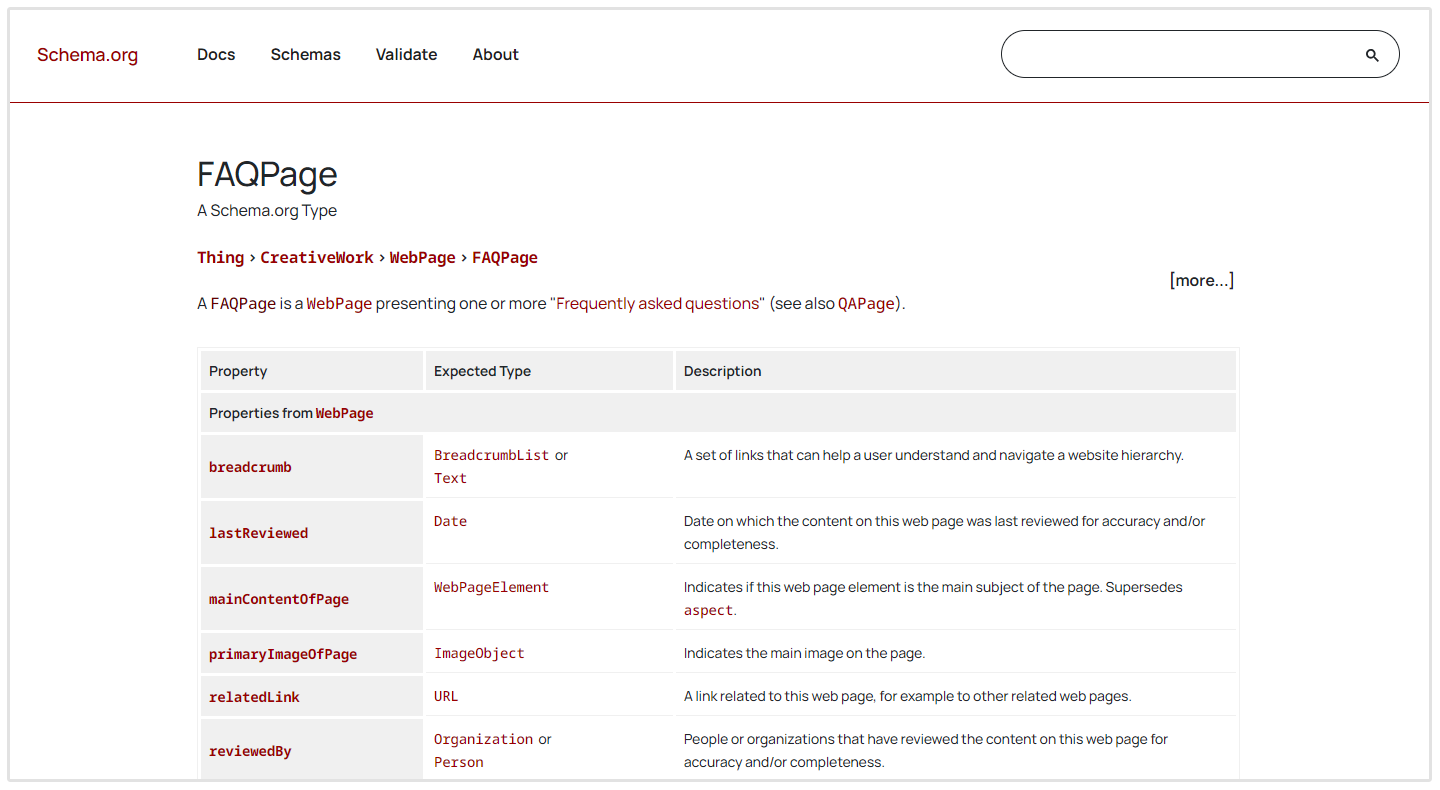
Here is the prompt to easily generate FAQ schema data using ChatGPT:
Prompt: Create FAQ schema markup for the questions and answers below. [List your questions]
Example: Create FAQ schema markup for the questions and answers below. What is SEO? SEO is optimizing a website to increase its organic visibility in search engines. When was Google launched? Google was launched on September 4, 1998, in Menlo Park, California.
29. Generate NLP-Friendly Answer To Rank in Featured Snippets
NLP algorithms generate natural language responses formatted to answer specific queries directly. They are helpful for voice SEO.
You can use the below command to ask ChatGPT to prepare NLP-driven answers for your target keywords:
Prompt: I need to rank in featured snippets for the query [share your topic or question keyword]. Provide a NLP-friendly and brief answer.
Example: I need to rank in featured snippets for the query "What is the role of schema markups in SEO?" Provide a NLP-friendly and brief answer.
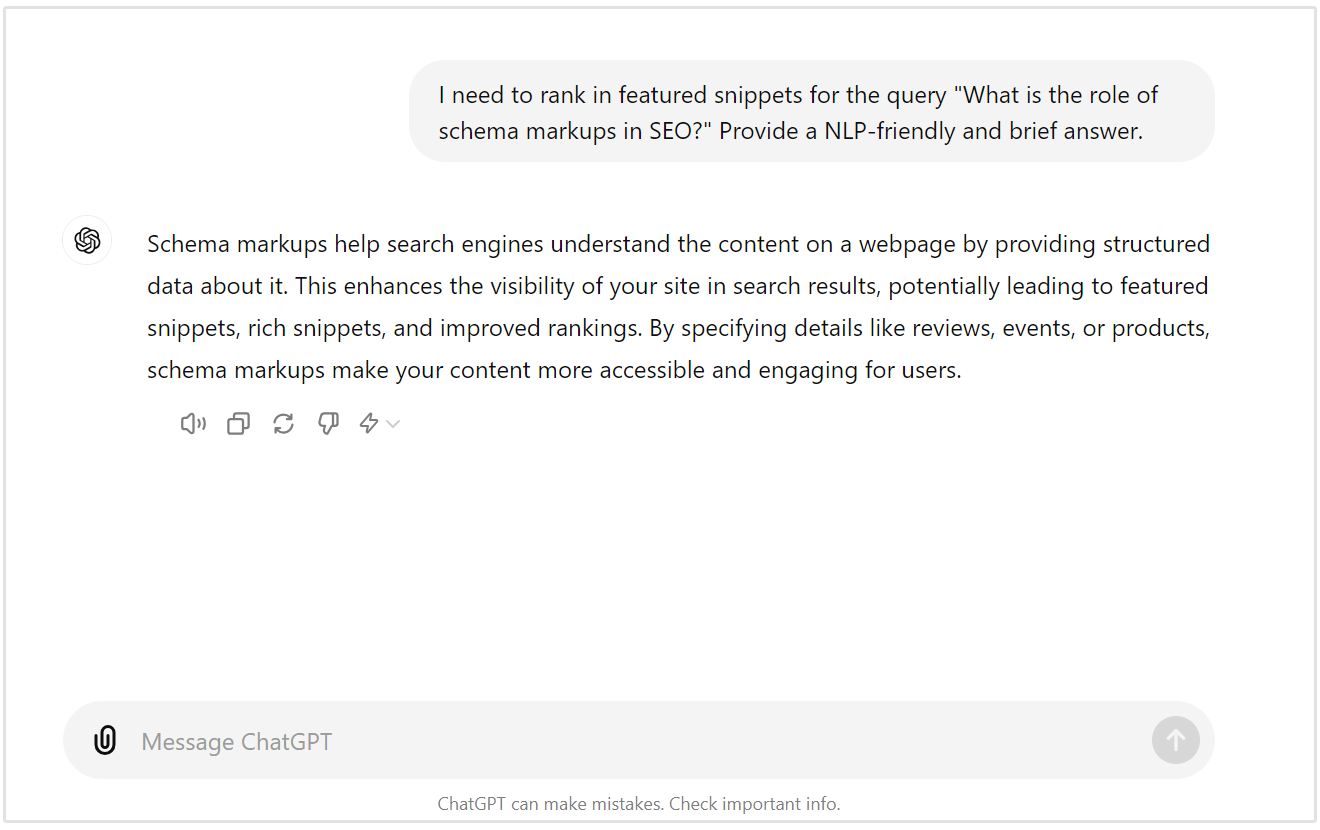
30. Prepare Hreflang Tags for International SEO
Hreflang tags are placed in the <head> section of HTML and indicate to search engines the language (ISO language code) and, optionally, the region (ISO country code) of a webpage's content.
International SEO consultants can use ChatGPT to produce accurate hreflang tags for their target pages and locations. Here is the prompt:
Prompt: Generate hreflang tags for audiences in [specify your location(s)]
Example: Generate hreflang tags for audiences in the USA, India, China, Russia, and the UAE.
What are the Benefits of Using ChatGPT for SEO?
Here are the top advantages of using ChatGPT to manage your SEO tasks:
- Content generation: ChatGPT can assist in generating content ideas, optimizing meta descriptions, crafting blog posts, and creating SEO-friendly copy, saving your time and effort.
- Keyword research: It can help identify relevant keywords and phrases based on your products or services. It can also examine your competitor’s content to share keywords they are targeting in their SEO strategy.
- Content audits and optimization: ChatGPT can analyze existing content for SEO effectiveness and suggest improvements such as updating outdated information, improving readability, and enhancing the E-E-A-T score.
What are the Limitations of Using ChatGPT for SEO?
Here are some drawbacks of using ChatGPT for search engine optimization:
- Limited understanding of technical SEO: ChatGPT's knowledge is based on general information and does not cover highly technical aspects of SEO, such as server configurations, advanced schema markup, or complex website architecture issues.
- Does not cover real-time SEO updates: SEO is a dynamic field with frequent updates to algorithms and best practices. ChatGPT's responses may not always reflect the latest trends or changes in search engine algorithms.
- Limited data analysis: ChatGPT cannot perform the in-depth data analysis that specialized SEO tools can, such as detailed keyword research, backlink analysis, or comprehensive SEO audits.
- No execution capability: ChatGPT provides advice and recommendations but cannot execute SEO strategies or implement technical fixes on websites. This requires human intervention and technical expertise.
- Dependency on user input: The quality of ChatGPT's responses depends on the clarity and specificity of the questions asked. Ambiguous or unclear queries may result in less accurate or relevant information.
- Lack of original content: ChatGPT generates responses based on existing data and patterns, which may lead to content that lacks originality or uniqueness. Creating original and compelling content is crucial for SEO success, as search engines prioritize valuable, distinct content.
- Misleading or wrong content: Due to its reliance on existing data and patterns, ChatGPT's responses occasionally include inaccuracies or outdated information. This poses a risk of misleading SEO advice, especially in rapidly evolving fields like SEO, where best practices change based on Google algorithm updates.
Conclusion
The above-listed best ChatGPT Prompts for SEO can help you prepare data-driven and user-focused SEO strategies.
With its vast capabilities, ChatGPT offers assistance in generating SEO-friendly content ideas, optimizing meta descriptions and title tags, identifying long-tail keywords, creating comprehensive content briefs, and much more.
Remember, while AI-generated content is a powerful tool, it should be reviewed by human editors to ensure quality and alignment with Google's guidelines.











